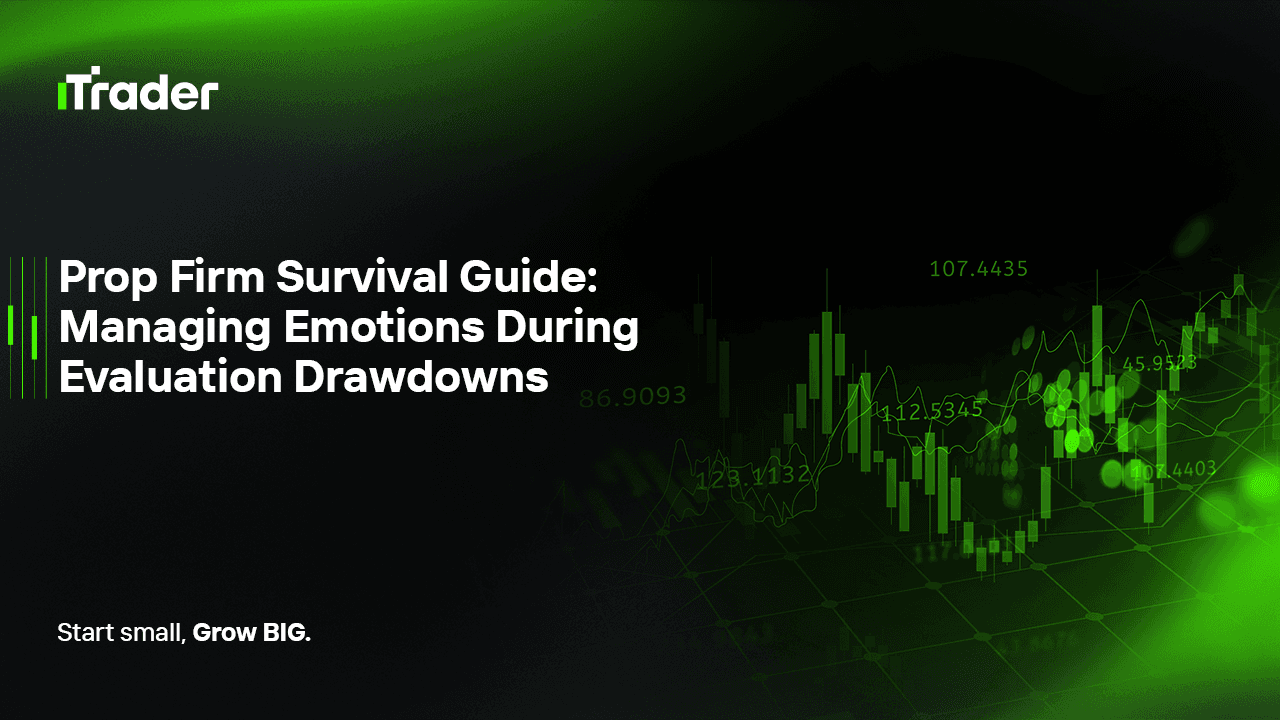2025-09-26
Prop firm challenges have become a gateway for aspiring traders to access larger trading capital. Passing such an evaluation means you can move beyond trading with your own limited funds and manage a professionally funded account. But behind this opportunity lies strict rules, unforgiving risk limits, and a true test of a trader’s discipline.

Most new traders prepare heavily on the technical side—indicators, strategies, backtests—yet they overlook the psychological challenge. The truth is that many traders fail not because of poor systems, but because they could not control their emotions when equity dropped. Drawdowns, in particular, are the most critical mental test.
This article explains what drawdowns are, why they matter in prop challenges, the emotional struggles they bring, and most importantly—how to manage them like a professional while staying beginner-friendly in approach.
A drawdown represents the decline in your account’s equity from its peak to the lowest point. For example:
Prop firms enforce strict limits such as:
Breaking either limit results in immediate disqualification, regardless of prior profits. That’s why drawdowns aren’t just numbers—they are the ultimate test of your risk management and discipline.
A drawdown is not just financial—it’s psychological. Traders under pressure often experience:
The thought of “I’m going to fail this challenge” leads to hesitation or closing trades too early.
Believing “The market is against me” can trigger impulsive decisions, breaking rules in search of quick revenge.
“I’m not good enough to be a trader” erodes confidence, leading to missed opportunities or giving up entirely.
The urge to win back losses quickly leads to oversized positions and risk-taking that only deepens the drawdown.
These emotions, if unmanaged, push traders into a downward spiral that usually ends with failing the challenge.
Have mechanical stop-points before emotions take over:
Such rules keep you from emotional overtrading.
Accept that drawdowns are part of the game, not proof of incompetence. Every system has natural fluctuations.
When emotions spike, step away. Deep breathing, a short walk, or even 10 minutes of detachment can reset your decision-making clarity.
Document how you feel during drawdowns. Over time, patterns emerge, giving you awareness of triggers that lead to mistakes.
Professional traders use meditation and visualization to mentally prepare for drawdowns, training the mind to stay calm under stress.
Experienced traders emphasize:
As one seasoned trader put it:
“You cannot control the market, but you can always control your response to it.”
Passing a prop firm challenge requires more than a profitable system. The real difference between those who succeed and those who fail lies in emotional control during drawdowns.
If you can:
you won’t just survive the challenge—you’ll build the foundation for a sustainable trading career.
In the end, the goal is not just to win trades, but to survive long enough to succeed.
2025 Ай Трейдер Глобал ХХК | Компанийн бүртгэлийн дугаар: 15962
Ай Трейдер Глобал ХХК нь Комор улсын Анжуан арал дахь Мутсамуду хотын Хамчакод байрлалтай. Тус компани нь Коморын Үнэт Цаасны Хорооноос (Securities Commission of the Comoros) олгосон L15962/ITGL дугаартай тусгай зөвшөөрлийн хүрээнд үйл ажиллагаа явуулдаг.
Ай Трейдер Глобал ХХК нь “iTrader” нэрийн дор үйл ажиллагаа явуулдаг бөгөөд (Форекс) арилжааны үйл ажиллагаа явуулах эрхтэй. Компанийн лого, барааны тэмдэг, вэбсайт нь зөвхөн Ай Трейдер Глобал ХХК компанийн өмч юм.
Ай Трейдер Глобал ХХК -ийн охин компани болох : iTrader Global Pty Ltd, Австралийн компанийн бүртгэлийн дугаар (ACN): 686 857 198. Энэ компани нь Opheleo Holdings Pty Ltd компанийн албан ёсны төлөөлөгч бөгөөд Австралийн санхүүгийн үйлчилгээний төлөөлөгчийн дугаар: 001315037 -тай. Австралийн санхүүгийн үйлчилгээний лицензийн дугаар: 000224485 -тай Level 1, 256 Rundle St, Adelaide, SA 5000 хаягт байршдаг. Анхааруулга: Энэ байгууллага нь энэхүү вэбсайт дээр болон дамжуулан арилжаалагдаж буй санхүүгийн (арилжааны) хэрэгсэл нийлүүлэгч биш бөгөөд ямар нэгэн хариуцлага хүлээхгүй болно.
Эрсдэлийн сэрэмжлүүлэг: CFD арилжааны хөшүүргийн улмаас хөрөнгөө хурдан алдах өндөр эрсдэлтэй тул бүх хэрэглэгчдэд тохиромжгүй байдаг.
Фанд, CFD болон бусад өндөр xөшүүрэгтэй арилжаа нь хэрэглэгчээс нарийн төвөгтэй ойлголтуудын талаар тусгай мэдлэг шаарддаг. Хөшүүрэгтэй арилжаанд оролцогчдын 84.01% нь алдагдал хүлээдгийг судалгаанууд харуулдаг тул хөшүүрэгтэй арилжаанд орохоос өмнө хөрөнгөө алдах маш өндөр эрсдэлтэй болохыг анхаарна уу.
iTrader нь аливаа иргэн, хуулийн этгээдийн өмнө xөшүүрэгтэй арилжааны эрсдэл, алдагдал, бусад хохирлыг бүхэлд нь хариуцахгүй болохыг мэдэгдэж байна.
Энэхүү веб сайтын мэдээ, мэдээлэл нь зөвхөн мэдлэг түгээх зорилготой тул хэрэглэгч та бие даан шийдвэр гаргана уу.
Хязгаарлалт: iTrader нь вэбсайт болон үйлчилгээгээ тухайн орны хууль тогтоомж, дүрэм журмаар хориглосон орнуудад оршин суугчдад чиглүүлдэггүй. Хэрэв та энэхүү вэбсайтыг ашиглахыг хориглосон оронд байгаа бол вэбсайт болон үйлчилгээг ашиглахдаа тухайн орны хууль тогтоомжид нийцэж байгаа эсэхийг шалгах үүрэгтэй. iTrader нь вэбсайтынхаа мэдээлэл бүх оронд тохиромжтой эсэхийг баталгаажуулдаггүй.
Ай Трейдер Глобал ХХК нь зарим улс орны иргэдэд үйлчилгээ үзүүлэхээс татгалздаг болно. Жишээлбэл: АНУ, Орос, Бразил, Канада, Израйл, Иран.